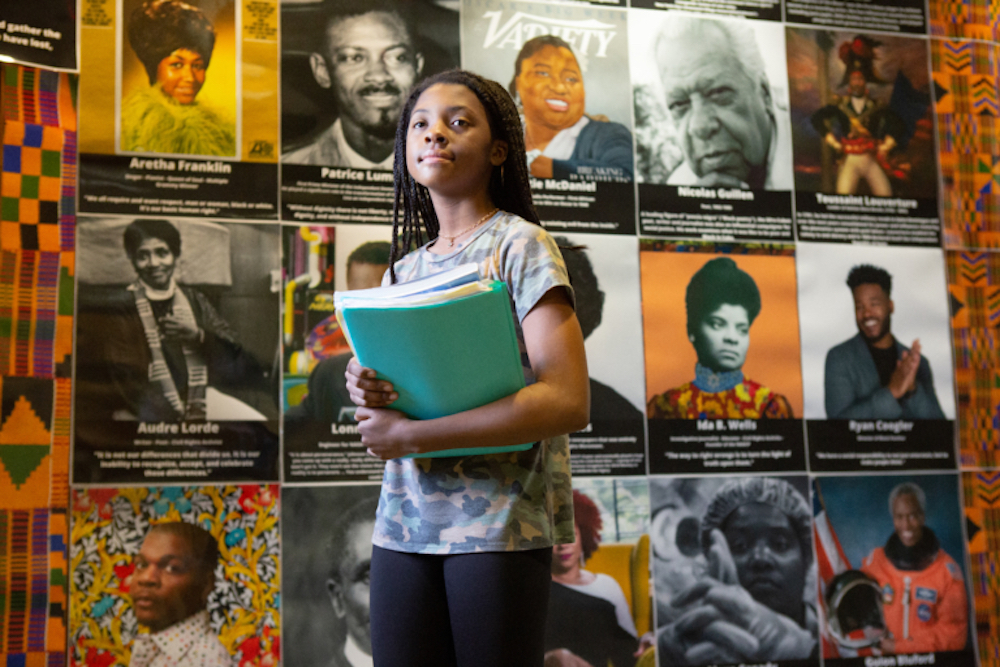
Black teachers: How to recruit them and make them stay

Lessons in higher education: What California can learn

Keeping California public university options open

Superintendents: Well-paid and walking away

The debt to degree connection

College in prison: How earning a degree can lead to a new life

Despite decades of reform efforts, Black students’ educational experiences continue to be shaped by anti-blackness, the general or specific contempt for blackness, resulting in Black people not being seen as fully human and worthy of having their civil rights and humanity observed and protected.

Keara Williams
Data on the more than 350,000 Black students in California schools suggests that we must do something different, as many are not being served well in the Golden State. Schools oftentimes are harbors for the production and maintenance of anti-blackness, consequently positioning Black students as uneducable and justifying policies and practices that are detrimental to their well-being.

Gene McAdoo
Institutionally, anti-blackness manifests in how school segregation limits Black students’ access to academic opportunities that would enable them to succeed academically. Moreover, even when Black students attend integrated and resource-rich schools, their schooling experiences continue to be tainted by anti-blackness, as they are frequently the targets of lowered expectations from teachers such as being seen as lacking intellectual gifts and talents, consequently, not being recommended for gifted programs, Advance Placement and honors courses. Another area is academic tracking where Black students are overrepresented in special education and low-level classes.

Tyrone C. Howard
Furthermore, schools’ dress code policies often criminalize their cultural dress such as their wearing of hoodies, durags, bonnets and hair scarves and deem such dress as threatening or inappropriate. Many times, Black students are called into offices or asked to remove these elements of their dress, which takes students away from class time and other important school-related activities. Anti-blackness further manifests in schools in their exclusionary disciplinary practices with infractions such as disrespect, willful defiance and insubordination, all highly subjective, which then results in schools suspending or expelling Black students as opposed to repairing harm through restorative language and practices. Educators should practice building relationships and supporting Black students before quickly suspending and punishing them.
Another frequent manifestation of anti-blackness is microaggressions from non-Black students’ peers and school staff. For example, Black and Afro-Latino students are not considered language learners and as a result, are negatively impacted by the lack of funding and language support that other English learner students benefit from. Also, their peers may ignore their multiple identities (intersectionality), ignoring their duality in culture and language.
Despite the endemic nature of anti-blackness in society, educators have a duty to work toward disrupting anti-blackness in schools. We suggest three ways for educational practitioners to do so and carve out possibilities for Black students to thrive in spite of anti-blackness.
The challenges that Black students face in schools are not new, but in many ways, they have become more pernicious and unrelenting. Schools must be explicit and unapologetic in their efforts to support Black students. Perhaps now, more than ever, with the pandemic highlighting gross schooling inequities experienced by Black students and their families during that period, it is necessary to be explicit about acknowledging, understanding and dismantling anti-blackness.
•••
Keara Williams is a doctoral student in UCLA’s urban schooling division and a former high-school English teacher.
Gene McAdoo is a first-year doctoral student in the urban schooling division at UCLA’s Graduate School of Education and Information Studies.
Tyrone C. Howard is a professor at the Graduate School of Education & Information Studies at UCLA. He is also the Pritzker Family endowed chair in Education to Strengthen Children & Families and director of the UCLA Black Male Institute.
The opinions expressed in this commentary represent those of the authors. EdSource welcomes commentaries representing diverse points of view. If you would like to submit a commentary, please review our guidelines and contact us.

Legislation that would remove one of the last tests teachers are required to take to earn a credential in California passed the Senate Education Committee.

Part-time instructors, many who work for decades off the tenure track and at a lower pay rate, have been called “apprentices to nowhere.”

A bill to mandate use of the method will not advance in the Legislature this year in the face of teachers union opposition.

Nearly a third of the 930 districts statewide that reported data had a higher rate of chronic absenteeism in 2022-23 than the year before.
Comments (3)
Comments Policy
We welcome your comments. All comments are moderated for civility, relevance and other considerations. Click here for EdSource's Comments Policy.
PHILLIP LEASURE 2 years ago2 years ago
So your solutions are:
1) Zealously monitor black students so they never feel as though they have any privacy and that you don’t trust them.
2) Treat them differently from their peers and place an emphasis on how different they are from other students.
3) Segregate them from classmates of different races.
Is that what I just read?
Mari 2 years ago2 years ago
More Black parents should homeschool. Unfortunately too many Black parents socialize and get their information in an all-Black bubble and still think homeschooling is for White fundamentalist Christians wearing prairie dresses living on a farm. Hispanic and Asian as well as White and Indigenous Californians who homeschool have shown that it is a vibrant and diverse landscape. There has been an explosion of resources for those who seek alternatives to the public school and traditional … Read More
More Black parents should homeschool. Unfortunately too many Black parents socialize and get their information in an all-Black bubble and still think homeschooling is for White fundamentalist Christians wearing prairie dresses living on a farm. Hispanic and Asian as well as White and Indigenous Californians who homeschool have shown that it is a vibrant and diverse landscape. There has been an explosion of resources for those who seek alternatives to the public school and traditional private school scenes.
It’s not fringe any more, and more and more wealthy and highly educated professionals from all ethnicities have been giving their children a first-class education outside the traditional public/private systems.
Martin Blythe 2 years ago2 years ago
Well said. At our majority-Latinx Los Angeles high school, Black teachers take the lead in all three areas you cite and, from my perspective at least, it seems to be working, indeed actually attracting more Black students to the school. I suppose it gets around which schools are welcoming and which ones are not. But, the main point I want to make, and some of us sound like a broken record with this, we must … Read More
Well said. At our majority-Latinx Los Angeles high school, Black teachers take the lead in all three areas you cite and, from my perspective at least, it seems to be working, indeed actually attracting more Black students to the school. I suppose it gets around which schools are welcoming and which ones are not. But, the main point I want to make, and some of us sound like a broken record with this, we must hire more Black teachers across the curriculum, and California is failing at that.